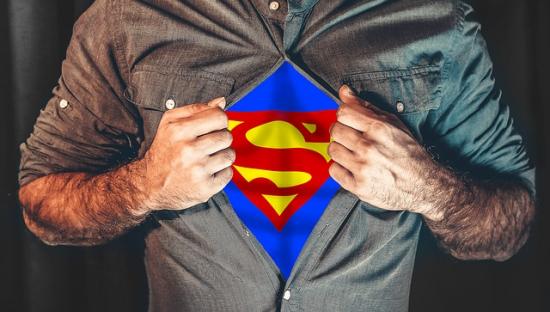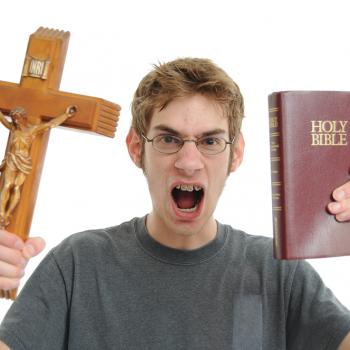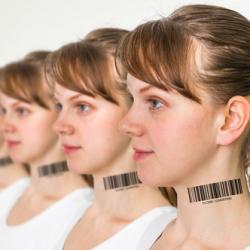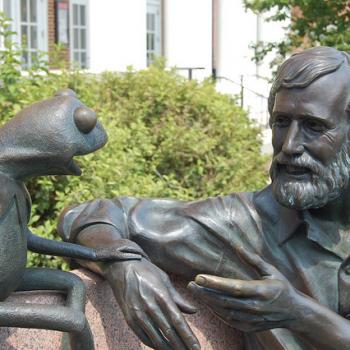
This month, my son’s kindergarten class celebrated National Reading Month by inviting “mystery readers” to their classroom. Parents could surprise their children by showing up to read a book to the class. I signed up thinking it would be a fun treat for Mickey, and went in last week to read.
I wasn’t prepared for how much it meant to him. When I arrived, he immediately ran up and threw his arms around me. In a picture taken by his teacher, he’s beaming brighter than I’ve ever seen him. When I asked if he was surprised, he told me, “Yes, but my brain told me you were coming.”
It took me awhile to piece together that odd sentiment and his almost relieved, overjoyed reaction when I walked into the room. But I soon understood that all month, Mickey had cast an anxious eye on the door waiting for me to be the surprise guest. When I arrived, he was so happy. Few things meant more than his dad showing up to read a book, to make his presence known. That night, he came up several times and gave me a hug or laid his head on my chest. My attention meant the world to him.
I’m learning very quickly that I’m my son’s hero. And it both honors and terrifies me.
Larger than life
I remember how I viewed my father growing up. He was larger than life, authoritative and important in a way no one else was. He set the tone for what an adult should be. He provided my picture of masculinity and morality, encompassing what hard work looked like and how a good man should live. I’m blessed to have been given a good father, one who displays integrity, loves God and takes care of his family.
While I can see some of my father’s traits passed on to me, the truth is I still feel like I’m waiting to live up to the model he set. I’m 38 years old; when my dad was this age, I was already 16 years old. I have a 6-year-old son and a 2-year-old daughter, and I sometimes feel perplexed about navigating the emotional terrain of day care and kindergarten; there’s no way I could be prepared at this age to re-enter into the confusion and frustration of high school life.
Right now, my kids view me without the clouding caused by hormones, angst and impending adulthood. There’s an innocence that hasn’t been sullied by fights, arguments and disappointment. Right now, they view me as I present myself, and I have to assume that the same mythical stature my dad took on is present in my son.
For Mickey, I’m a hero. He relishes Saturday mornings where I drop everything and take him out for donuts or pancakes. He loves to show me off to his classmates. There’s nothing greater than when I take time out to spend an afternoon at the movies with him or just put aside whatever I’m doing to play video games. He brings home pictures of the two of us hanging out and he gets excited if there’s a day when I stay home. My daughter hasn’t jumped into the hero worship stage. She loves me, of course, but love from Cece is of the hard-won toddler variety. But with Mickey, I’m the one who shapes his outlook, reassures him when he’s anxious, makes him feel worthy when I’m proud of him, and helps portray what a man should look like.
Hero or villain?
We all like to imagine ourselves as super-parents. It’s good to know that our kids see us as heroes, and inspiring to think that we play a role in shaping them into adults. But that privilege also scares me to death.
I feel proud when Mickey reflects the best of me. He’s an imaginative, sensitive boy, just like I was. He loves movies and superheroes, he asks deep spiritual questions, and time with his friends and family mean the world to him. I look at his newfound love of reading, the way he careens around the house pretending to be a Jedi and his unbreakable bond with his stuffed Fozzie Bear and I see a bright, compassionate young boy who I couldn’t be prouder of, and who displays many of the qualities I did in my youth.
But I also see seeds of my worst traits, and I want to keep myself away so he doesn’t absorb any more of them. I see the anger that arises when he gets frustrated, the jealousy that rears its head when he believes his sister is getting too much attention. I see the laziness that causes him to flop in front of the TV or take shortcuts that keep him from learning. I see lapses in common sense that are all too familiar and a general lack of intentionality in daily moments that has tripped me up more times than I’m comfortable admitting.
Just as I’ve turned into my father, my son is turning into me, and much earlier than I’d ever imagined. While I hope I’ve passed along some of the my more honorable traits, the truth is that I’m also afraid that I’ve given him my flaws. I understand now why parents lament that they don’t want their children to turn out like them; they want them to be better. But we’ve handicapped them from the start just by existing as sinners.
I’m my own kryptonite
I’m aware that I’m too often the bad guy instead of the hero. God puts us into relationships to show us our flaws and improve us, and in the last six years I’ve become too familiar with the impatience, anger and frustration inside of me, traits I thought were long lost but really had just gone dormant during years of singleness. When my son makes me angry, I yell. When he misbehaves, I lash out. When the kids are loud, I bemoan the interruption of my solace.
In these moments, my son is distraught. My anger reveals me to be a villain, my disinterest to play when I’m tired breaks his heart. The man he looks up to appears to be at odds with him, and that’s a problem when you depend on that man for so much of your identity and self-esteem. In the moment, I know my irrational anger, impatience and desire for solitude are wrong. Yet too often, instead of having my moment of redemption and joining forces, I grow petulant and dig deeper into my villainous self, blaming it on a stressful day at work, the weariness of old age, or my kids’ rambunctiousness. I’m disappointed in myself for not being Super-Dad, but doesn’t every hero have his weakness?
But the truth I don’t want to admit is that my kryptonite is of my own design. It’s not a stressful job or getting older that makes me lazy, aloof or angry. It’s selfishness. It’s my desire to have time to myself, to do what I want to do, to control the people (and noises) in the house. When things go my way, I’m happy. When my plans are thwarted, my control undermined or my hopes disappointed, I lash out. The external things are not the problem; instead, it’s the internal warped nature that demands that life be dedicated to making me comfortable, happy and the center of the universe. My kryptonite is my idol; my idol is me.
I don’t want to say it was okay when I was single, but it was certainly more accepted and less noticeable. Now I have a wife and two children who need me to sacrifice (the most heroic thing you can do) and yet I cling to control and things that elevate me. Worse, I expect them to be fawning admirers or slaves who exist to make my life easier, boost my esteem or help me achieve my goals. Too often, instead of being a hero to look up to, I’m a bad guy who wants to keep them under my boot.
This hides behind a secret identity of respectability and spirituality. Parenting and marriage have ripped that away, revealing the true self beneath. And I see it too often and am ashamed. I let my son, daughter and wife down instead of supporting them, fighting for them or just enjoying my time with them.
So what do I do?
I need to turn to a Father who models goodness. Who loves sacrificially, forgives abundantly and rejoices over His children. I need to trust that in my weakness, He is strong and that following His model is the only way I’ll be the man my family needs me to be. And instead of letting my son worship me as a hero, I’ll be honest about my failures and direct Him to the one who will never let Him down.












